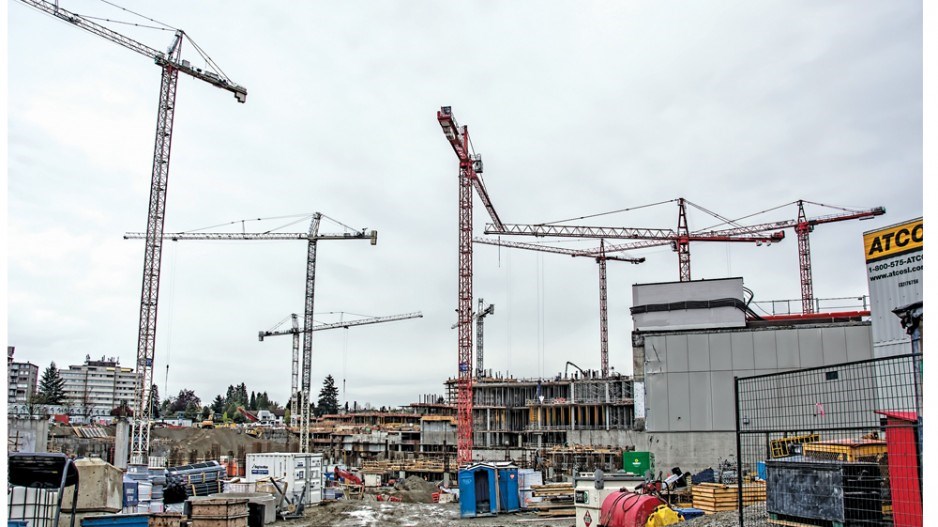Experts are warning that Canada’s immigration plans need to change so that industry can better meet the demand for residential construction in B.C.
As the provincial population grows at a record-level pace, the need for new housing has skyrocketed – and created acute demand for residential construction workers.
In November, the federal government introduced a Housing Action Plan that highlighted its intention to focus this year’s express entry immigration application program on candidates with work experience in areas such as carpentry, electrical, plumbing, contracting and in other trades need to help build more homes, faster.
Some B.C. industry leaders said the focus was a big step forward, but that further action and tweaking of these plans are needed to effectively address the labour shortage in the residential construction industry.
“The government’s solution to prioritize construction workers for permanent residency solely hinges on the new category-based selection process to expedite entry for permanent residency applicants with specific trade skills,” said Anita Huberman, president and CEO of the Surrey Board of Trade, in a statement.
“Despite this program’s utility, it excludes applicants with experience as construction trades helpers and labourers, which is one of the top two residential construction occupations most in need of workers.”
Trevor Koot, CEO of the British Columbia Real Estate Association, said the plan shows the progress Ottawa has made on the issue, but that more needs to be done to bring a larger number of skilled workers into B.C.’s construction industry. More flexible immigration requirements could help address the current skills gap, he said.
It is estimated that there will be 4,500 unfilled jobs in the residential construction industry in B.C. in 2024, according to the Canadian Builders Association of BC (CHBA BC). These labour shortages may cause a delay in projects and could increase building costs and housing prices.
“Really, it’s making sure that through the various immigration programs – including Immigration, Refugees and Citizenship Canada – that there’s opportunity for a higher number of skilled labour folks as a portion of those immigration numbers that are allowed under the various programs,” said Koot.
“And to give a little bit more flexibility on requirements like the language requirements, because to offer the skills that are required to build a home are far more important than somebody having a dual language or other requirements that the immigration programs are outlining right now.”
Koot said current immigration policies still focus a lot on economic, education and language requirements, but that the people who meet those requirements don’t necessarily want to work in skilled trades jobs.
About two-thirds of people selected through Canada’s express entry system listed an intended occupation in a professional occupation, as opposed to a technical job or skilled trade in 2018, according to a report released by the Conference Board of Canada released last November.
And skilled workers coming into Canada through the federal skilled trades program under express entry need to have a job lined up already, which can be challenging in the residential construction industry, according to Neil Moody, CEO of CHBA BC.
“In residential construction, often they’ll move around to various companies. And if it’s cyclical, they don’t always have that first job. So [policies] could focus more on skills,” said Moody.
Additionally, the process for the federal temporary foreign worker program is so “cumbersome,” he said, that many employers – especially small and medium-sized companies – don’t have the capacity or resources to utilize the program.
“It gets back to matching immigrants to skilled labour. If you have all the immigrants coming in and you’re not matching skills, then you’re not getting them where you need them.… There’s still going to be a chronic shortage.”
Huberman said a small-scale program to recruit construction trades helpers and labourers would significantly decrease residential construction labour shortages.
Some provinces have done this. In October, Nova Scotia launched a critical construction worker pilot program – a new pathway offering permanent residency to people with experience in one of 21 construction occupations experiencing labour shortages. Applicants need to have a job offer from a Nova Scotian employer to be eligible.
“We need immigration to grow and to fulfill the housing needs that both B.C. and Canada have.... Maybe it’s looking at countries with relatively young populations – whether it’s India, the Philippines, Jamaica, Ireland or [in] Latin America – and matching the skills and allowing them to come in to fulfill the needs,” said Moody.




